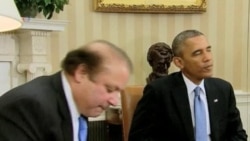Some Pakistani opposition parties are calling for a blockade of supply lines to NATO forces in Afghanistan in retaliation for U.S. drone strikes inside Pakistan. But, experts in Washington believe retaliation would further hurt already strained U.S.-Pakistan relations.
The suspected U.S. drone strike that killed Pakistani Taliban leader Hakimullah Mehsud came just days after Pakistani Prime Minister Nawaz Sharif's recent meeting at the White House, which seemingly set a positive tone in improving bilateral relations.
The strike led a top Pakistani cabinet minister to denounce Washington for sabotaging Pakistan's domestic peace. And some Pakistani opposition parties are now calling for blocking NATO supply lines to forces in Afghanistan.
Former U.S. Ambassador Bill Milam, of Washington’s Wilson Center, says that would not help U.S.-Pakistan relations.
"We would not view it as a friendly act, obviously. We are determined to get out of Afghanistan, and through Pakistan is the best way. We would be very unhappy if these roads are blocked," said Milam.
Outraged by U.S. strikes, some in Pakistan are demanding the drones be shot down. Defense analyst Thomas Lynch says that is something Pakistan's government should not consider.
"I think there a stark understanding that Washington would view this as an abrogation of an alliance and a statement saying, 'No we are not against these terrorists and therefore, we are not standing with you and the international community.' And there would be consequences from that," said Lynch.
Pakistan's government calls the drone strikes a violation of the country's sovereignty. But a recent report in Washington Post claimed the strikes are conducted with Pakistan’s consent. Pakistan denies that.
The U.S. says the strikes undermine terrorism by targeting militants that carry out attacks in Afghanistan and Pakistan. Lynch says it is time for Washington to be transparent about the drone policy.
"I think when President Obama talked about his willingness to work with the government of Pakistan, he was referring not to a promise to end the drone strikes when targets like Biatullah Mahsood and Hakimullah Mahsood become available, but instead to try to be more transparent and open about where there is collaboration in these cases," he said.
But analyst Milam says both sides need to work to mend the U.S.-Pakistan relationship.
"I would not be surprised to see a hold-back on the drone program for some time. And we will try to smooth out the relationship, get over the rough patch, and see if we can avoid the problems that blocking the exit routes would bring to us, and frankly to our relationship," he said.
The experts say that for long-term stability in bilateral relations, Washington and Islamabad need transparent dealings.
The suspected U.S. drone strike that killed Pakistani Taliban leader Hakimullah Mehsud came just days after Pakistani Prime Minister Nawaz Sharif's recent meeting at the White House, which seemingly set a positive tone in improving bilateral relations.
The strike led a top Pakistani cabinet minister to denounce Washington for sabotaging Pakistan's domestic peace. And some Pakistani opposition parties are now calling for blocking NATO supply lines to forces in Afghanistan.
Former U.S. Ambassador Bill Milam, of Washington’s Wilson Center, says that would not help U.S.-Pakistan relations.
"We would not view it as a friendly act, obviously. We are determined to get out of Afghanistan, and through Pakistan is the best way. We would be very unhappy if these roads are blocked," said Milam.
Outraged by U.S. strikes, some in Pakistan are demanding the drones be shot down. Defense analyst Thomas Lynch says that is something Pakistan's government should not consider.
"I think there a stark understanding that Washington would view this as an abrogation of an alliance and a statement saying, 'No we are not against these terrorists and therefore, we are not standing with you and the international community.' And there would be consequences from that," said Lynch.
Pakistan's government calls the drone strikes a violation of the country's sovereignty. But a recent report in Washington Post claimed the strikes are conducted with Pakistan’s consent. Pakistan denies that.
The U.S. says the strikes undermine terrorism by targeting militants that carry out attacks in Afghanistan and Pakistan. Lynch says it is time for Washington to be transparent about the drone policy.
"I think when President Obama talked about his willingness to work with the government of Pakistan, he was referring not to a promise to end the drone strikes when targets like Biatullah Mahsood and Hakimullah Mahsood become available, but instead to try to be more transparent and open about where there is collaboration in these cases," he said.
But analyst Milam says both sides need to work to mend the U.S.-Pakistan relationship.
"I would not be surprised to see a hold-back on the drone program for some time. And we will try to smooth out the relationship, get over the rough patch, and see if we can avoid the problems that blocking the exit routes would bring to us, and frankly to our relationship," he said.
The experts say that for long-term stability in bilateral relations, Washington and Islamabad need transparent dealings.





